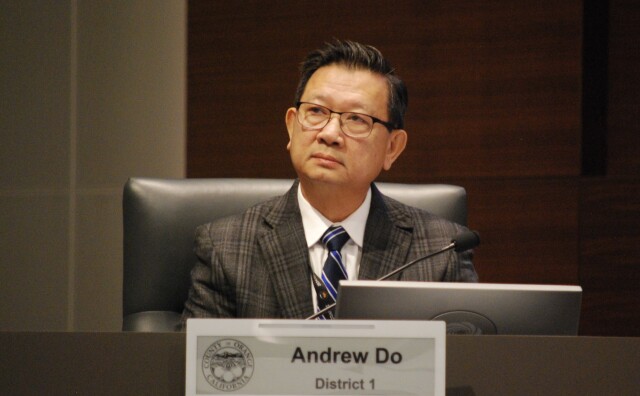The Lynwood Unified School District is asking voters to approve a property tax increase to fund $80 million million in renovation and repair projects.
At least 55% of voters need to approve Measure U for it to pass.
Official title on the ballot: Lynwood Unified School District Measure U
You are being asked: Can Lynwood Unified School District borrow $80 million to fund repairs, renovations and construction?
-
A "yes" vote means: The district can borrow $80 million to construct new buildings, repair and renovate existing public schools.
A "no" vote means: The district cannot borrow $80 million to construct new buildings, repair and renovate existing public schools.
-
City of Los Angeles
- City Council: Vote for districts 2, 10 and 14.
- Charter Amendment ER: A package of ethics reforms designed to fight corruption at City Hall. Plus: Charter Amendments DD, FF, HH and II.
L.A. County
- Board of Supervisors: Measure G would dramatically overhaul county government.
- District Attorney: Criminal justice reform, or more law-and-order justice?
- LA Unified school board: Voters are also deciding on a $9 billion facilities bond and a redistricting measure.
- School district measures: Schools have a lot of repair needs.
- Superior Court judges: Plus: Tips to make sure you're putting right person on the bench.
Statewide races
- Whoa! There are 10 propositions on the ballot. Here's your cheat sheet to Props. 2, 3, 4, 5, 6, 32, 33, 34, 35 and 36.
Jump to the full Voter Game Plan for dozens more races ▶
Understanding Measure U
The Lynwood Unified School District serves more than 11,000 students across 18 schools. LUSD wants money to fix deteriorating roofs, plumbing, and electrical systems; improve safety and security systems; and repair, construct, and acquire classrooms and labs, among other things.
School districts rely on voters to approve statewide and local bonds to pay for repairs, renovations, and new construction. This year, Lynwood voters will decide whether to support one of each: the district’s Measure U and the statewide Proposition 2. (We’ve got a voter guide for that one, too.)
A bond is basically a loan that a school district takes out, and which property owners in that school district pay back through property taxes.
If at least 55% of voters approve Measure U, the Lynwood Unified School District can issue up to $80 million in bonds to finance specific school facilities projects.
The district told LAist in a survey that the top three priorities are:
- Roofing
- Heating, ventilation, and air conditioning (HVAC)
- Campus modernization
Make It Make Sense: Election 2024 Edition
Lynwood Assistant Superintendent of Business Services Gretchen Janson told LAist that parents want facilities that prepare students for college and career, like better classrooms focused on STEM subjects (science, technology, engineering, and math.)
"The students that we serve here, they're exceptional," Janson said. "They deserve to go to schools that they're proud of. They deserve to go to schools that are not just safe, but that are welcoming, that are pleasant."
The money borrowed through the measure would be paid back through a property tax. The district estimates the bond would cost property owners that live within the school district's boundaries an average of $50 per $100,000 of assessed value. There’s also a possibility that Lynwood Unified School District could get additional state funding if Prop. 2 passes.
Districts cannot spend bond money on employee salaries and are required to commission independent audits of bond spending.
-
- Find your property’s assessed value on the L.A. County Assessor’s website.
- Divide your assessed value by $100,000 and multiply that number by $50.
- The resulting number is the estimate of the annual property tax increase associated with Measure U.
- Remember: Your property’s assessed value will change, but increases are limited to 2% per year, except when a property changes ownership or undergoes new construction.
- Rent? It’s possible that landlords pass increased property taxes on to tenants, but the limits on annual rent hikes depend on where you live.
What supporters of school bonds say
Research links higher student achievement to better quality schools — it’s easier to learn in clean, climate-controlled, well-lit classrooms.
In California, there’s no dedicated stream of funding to support the upkeep of the 10,000 public K-12 schools attended by 5.9 million students. The majority of the money schools receive from the state every year supports students, staff salaries and other day-to-day expenses.

Throughout the state, 38% of K-12 students go to schools that do not meet the minimum standard to be considered clean, safe, and functional.
If the state and local measures fail, the need for funding will remain.
“Those buildings are not going to magically renovate themselves while we're waiting for a better bond,” said Sara Hinkley, the California program manager at the Center for Cities + Schools at UC Berkeley.
Lynwood Mayor Pro Tem Rita Soto, California School Employees Association Lynwood Chapter President Diana Hawkins, and several teachers are are among those who submitted an argument in favor of the bond to the L.A. County Registrar-Recorder.
Read more:
-
The lottery does contribute money to public education — L.A. County alone has gotten $11 billion since 1985 — but as revenues ballooned in recent years, school funding stagnated.
-
When California voters approved the creation of the lottery, the law required 34 cents of every dollar to fund education. In 2010 lawmakers changed the rules giving the lottery the mandate to “maximize” funding for education.
-
Now there are bigger jackpots, but fewer dollars for schools. A 2018 LAist investigation found the lottery’s contributions had dropped to 23 cents per dollar.
-
And in 2020, the California State Auditor found the lottery “has not provided required funding to education” and shorted schools tens of millions of dollars.
What critics of school bonds say
In general, critics of bonds often say the cost to property owners is too high and question why school districts with declining enrollment need money for construction when they’re serving fewer students.
The Howard Jarvis Taxpayers Association is a frequent opponent of state and local school bonds. The nonprofit is dedicated to upholding Prop. 13, the 1978 constitutional amendment that limited changes to California property taxes.
“We think bond financing has its place, but it should be judicious because it raises property taxes at the local level,” said Susan Shelley, HJTA’s vice president of communications.
The Association has not taken a position on specific local bonds other than LAUSD’s $9 billion Measure US (no) and on Prop. 2 (also no).
Shelley said voters weighing school bonds should carefully consider how the school spent previous bond funding and the plans for future projects.
“You should have confidence that the priorities are right,” Shelley said. “And if they're not, say no and make [the district] come back to you with a better plan.”
Several people who list themselves as "owners" submitted an argument against the bond to the L.A. County Registrar-Recorder. The opposition is largely rooted in the cost to residents.
Who is in charge of all this money?
State law lays out several accountability measures for local school district bonds, including:
- The creation of an independent bond oversight committee that includes:
- At least seven members
- Representatives of the business community, taxpayers, and parents. School district employees, vendors, contractors, and consultants cannot be appointed.
- Independent, annual performance audits of bond-funded projects and spending
"We want to ensure that the community has a voice and is able to take a look and review all the things that we've done to make sure that we're doing the things that we promised we were going to do," Janson said.
How long would construction take?
While districts identify projects that could benefit from improvements, that list is not a guarantee of which projects will be funded.
There are often years of community meetings, design, and permitting between the passage of a bond and the start of construction, though minor renovation projects could be completed sooner.
Lynwood voters approved a $65 million bond, Measure N, in 2016. One example of a project funded by that measure is more secure campus entries.
Potential financial impact
A bond is basically a loan. The bond authorized by Measure U would be paid back — with interest — through local property taxes.
Further reading
- What is a bond? Why am I always being asked to vote for one?
- A $10 billion bond alone won’t fix California schools so districts weigh local options
Before you read more, we wanted to take a moment to tell you about our mission here at LAist, and why we're so dedicated to helping you get ready to vote.
In the lead-up to this important election, our hard-working reporters and editors spent hundreds and hundreds of hours researching and writing these detailed guides and fact-based resources. We invested that time because we're here to help you vote confidently and make your community a better place.
But we cannot do this essential work without your help. We rely on donations from readers like you to stay independent, which keeps our nonprofit newsroom strong and accountable to you.
At a time when the need for local journalism has never been greater, many newsrooms are facing cutbacks, including LAist. Member support — your support — is what will sustain a free press in Southern California.
LAist’s mission is to be here for you, so please be here for us now with a donation to power our trusted local reporting. Step up right now and make the choice to give. Because that’s exactly what it is — a choice. It's choice with consequences. If readers do not choose to step up and donate, the future of fact-based news in Southern California will not be as strong.
No matter what happens in the world, LAist will remain a voice you know and trust.
Thank you for your generous support.
Sincerely,
-
(she/her)









